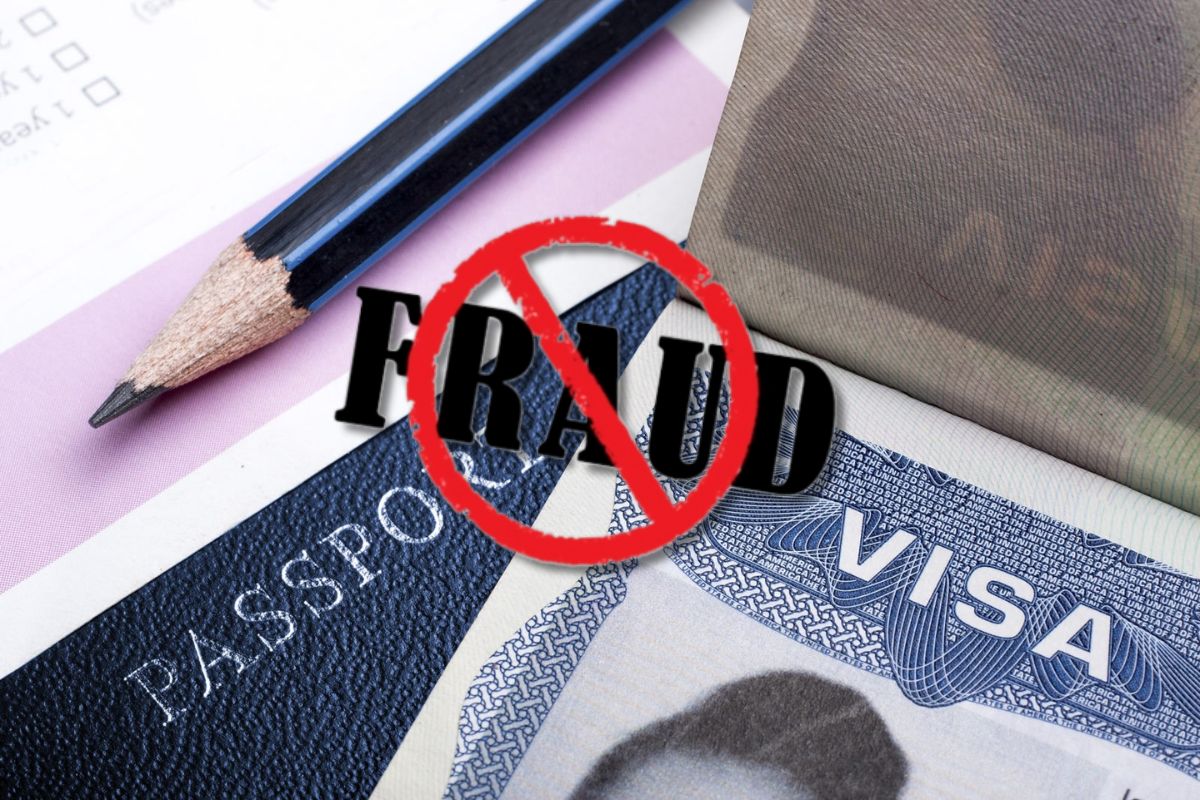
Immigration scams are deceptive schemes that prey on the hopes and aspirations of individuals seeking to immigrate to a new country. These scams often promise quick and easy solutions to complex immigration processes, luring victims with promises of expedited visas, guaranteed green cards, or employment authorization. However, behind these alluring promises lies a web of deception and financial exploitation.
Navigating the complexities of immigration can be a daunting task, often filled with uncertainty and anxiety. Amidst this challenging landscape, unscrupulous individuals prey on vulnerable individuals, seeking to capitalize on their desperation for a better life. Immigration scams continue to plague the world, leaving unsuspecting individuals financially and emotionally drained, and sometimes even putting them in danger.
Common Immigration Scams to Watch Out For
- Visa and Green Card Services: These scams often promise expedited visa processing, guaranteed green cards, or assistance with obtaining employment authorization. However, these services are often bogus, and individuals may end up paying exorbitant fees for little to no results.
- Labor Recruiters: Fraudulent labor recruiters lure individuals with promises of high-paying jobs abroad. However, upon arrival, they may find themselves trapped in labor exploitation, subjected to poor working conditions, unpaid wages, or even forced labor.
- Romance Scams: These scams involve individuals posing as potential romantic partners online, gaining the trust of unsuspecting victims and then requesting financial assistance. The victims often fall for the emotional connection, only to realize they have been deceived.
- Consular Agent Scams: These scams involve individuals impersonating legitimate consular officials, charging fees for immigration-related services that are not authorized by the government. Victims may be asked to pay for visa processing, passport renewals, or other services that are not only unnecessary but also illegal.
- Employment Scams: These scams involve individuals offering employment opportunities to foreigners, but then demand upfront fees for work permits, visas, or other processing charges. Victims often lose their money and never receive the promised employment.
Most Red Flags to Identify Immigration Scams
- Pressure to Act Quickly: Legitimate immigration processes require time and due diligence. If someone is pressuring you to make a quick decision, it’s a red flag.
- Demand for Upfront Fees: Legitimate immigration services should not require upfront fees. They usually charge after services are rendered.
- Requests for Personal Information: Legitimate immigration services will only ask for information that is strictly necessary for the process. Be cautious of requests for sensitive personal data or bank account details.
- Unrealistic Promises: If someone is promising you an easy or guaranteed path to immigration, it’s likely a scam. Immigration is a complex process, and there are no shortcuts.
- Anonymous or Unregistered Services: Legitimate immigration service providers should be registered with the appropriate authorities. Check for proper licensing and contact information.
- Suspicious Communication: If you receive unsolicited emails, text messages, or social media messages offering immigration-related services, be wary. These are often scams.
Q&A to Unravel the Complexity of Immigration Scams
Q1: Why are immigration scams so prevalent?
A1: Immigration scams are prevalent due to a combination of factors, including:
- The high demand for immigration services: There is a significant demand for immigration services, as many people around the world aspire to live and work in new countries. This creates an opportunity for scammers to prey on desperate individuals.
- The complexity of the immigration process: The immigration process can be complex and confusing, making it difficult for individuals to know what is legitimate and what is not. This allows scammers to take advantage of people’s lack of knowledge.
- The anonymity of the internet: The internet provides a convenient platform for scammers to operate without being easily identified or caught. They can create fake websites, social media profiles, and email addresses that look legitimate.
Q2: What are some of the most common disguises used by immigration scammers?
A2: Immigration scammers often disguise themselves as legitimate government officials, immigration lawyers, or employment agencies. They may also pose as potential romantic partners or online friends. By building trust with their victims, scammers can gain access to personal information and financial resources.
Q3: What are some of the most common tactics used by immigration scammers?
A3: Immigration scammers employ a variety of tactics to deceive their victims, including:
- Promises of quick and easy immigration: Scammers often promise victims that they can obtain visas, green cards, or other immigration benefits quickly and easily. This is often too good to be true and should raise red flags.
- Demands for upfront fees: Legitimate immigration service providers typically charge fees after services are rendered, while scammers often demand upfront payments. This is a major red flag, as legitimate services should not require upfront payments.
- Requests for sensitive personal information: Scammers may ask victims to provide sensitive personal information, such as passports, bank account details, or social security numbers. This information can be used for identity theft and other fraudulent activities.
Q4: What are some of the most common consequences of falling victim to an immigration scam?
A4: The consequences of falling victim to an immigration scam can be severe, including:
- Financial loss: Scammers often demand large sums of money from their victims, and this can lead to significant financial hardship.
- Identity theft: Scammers may use stolen personal information to commit identity theft, opening credit cards in victims’ names or taking out loans in their name.
- Deportation or denial of entry: In some cases, victims of immigration scams may be deported from the country they were trying to immigrate to, or they may be denied entry to the country altogether.
Q5: How can individuals protect themselves from immigration scams?
A5: To protect themselves from immigration scams, individuals can follow these tips:
- Beware of unrealistic promises: If something sounds too good to be true, it probably is. Legitimate immigration services do not offer guarantees.
- Do your research: Before engaging with any immigration service provider, thoroughly research them and check their credentials.
- Trust your instincts: If something feels off, trust your gut and walk away. Don’t rush into any decisions.
- Never provide sensitive personal information: Never provide sensitive personal information to anyone you do not trust, especially over the phone or through email.
- Report scams to the authorities: If you believe you have been scammed, report it to the relevant law enforcement agencies.
Protection and Retorting Against Immigration Scams
- Do Your Research: Before engaging with any immigration service provider, conduct thorough research. Check their credentials, read reviews, and inquire about their fees and services.
- Verify Legitimacy: Contact the relevant government agencies or consulates to verify the authenticity of any immigration services you are considering.
- Trust Your Instincts: If something feels off, it probably is. Don’t hesitate to walk away from suspicious offers or requests.
- Report Scams: If you believe you have been a victim of an immigration scam, report it to the appropriate authorities. This helps to bring scammers to justice and protect others from falling victim.
- Seek Legal Guidance: If you have suffered financial losses or other damages due to an immigration scam, consider seeking legal counsel. An attorney can help you understand your rights and options for pursuing restitution.
Where You Can Report Immigration Scams
Here are some of the places where you can report immigration scams:
United States government agencies:
- Federal Trade Commission (FTC): The FTC is the primary consumer protection agency in the United States. You can report a scam to the FTC online at https://www.ftc.gov/media/71268 or by calling 1-877-FTC-HELP (1-877-382-4357).
- Immigration and Customs Enforcement (ICE): ICE is the federal agency that enforces immigration laws in the United States. You can report a scam to ICE online at https://www.ice.gov/ or by calling 1-800-CALL-ICE (1-800-225-5388).
- Department of State Bureau of Consular Affairs: The Bureau of Consular Affairs is responsible for U.S. citizen services overseas. You can report a scam to the Bureau of Consular Affairs online at https://travel.state.gov/content/travel/en/contact-us/reporting-fraud.html or by calling 1-888-407-4747.
International organizations:
- International Organization for Migration (IOM): The IOM is an intergovernmental organization that works to promote safe and orderly migration. You can report a scam to the IOM online at https://www.iom.int/resources/report-abuse-fraud-or-misconduct or by calling +41 22 717 91 11.
- World Bank: The World Bank is an international financial institution that provides loans and grants to developing countries. You can report a scam to the World Bank online at https://wbgcmsprod.microsoftcrmportals.com/en-US/anonymous-users/int-fraud-management/create-new-complaint/ or by calling +1 202-473-1000.
In addition to these government agencies and international organizations, there are also a number of non-profit organizations that can help you report immigration scams. These organizations can provide you with information and resources about how to protect yourself from scams, and they can also help you report scams to the appropriate authorities.
Here are some examples of non-profit organizations that can help you report immigration scams:
- National Consumers League (NCL): The NCL is a consumer advocacy organization that provides information and resources about scams. You can report a scam to the NCL online at https://nclnet.org/our-work/fraud-prevention/ or by calling 1-800-843-9378.
- Alliance of Valiant Arms: The Alliance of Valiant Arms is a non-profit organization that provides support to victims of immigration scams. You can report a scam to the Alliance of Valiant Arms online at https://www.justice.gov/eoir/fraud-and-abuse-prevention-program or by calling 1-888-448-1582.
- A21 Campaign: A21 is a non-profit organization that fights human trafficking. You can report a scam related to human trafficking to A21 online at https://www.a21.org/ or by calling 1-888-373-7888.
By reporting immigration scams to the appropriate authorities, you can help to protect yourself and others from being scammed. You can also help to bring these scammers to justice and prevent them from harming others.
Remember, vigilance and informed decision-making are your best weapons against immigration scams. By being aware of these common red flags and taking steps to protect yourself, you can navigate the immigration process safely and avoid becoming a victim of predatory individuals.











Be the first to comment